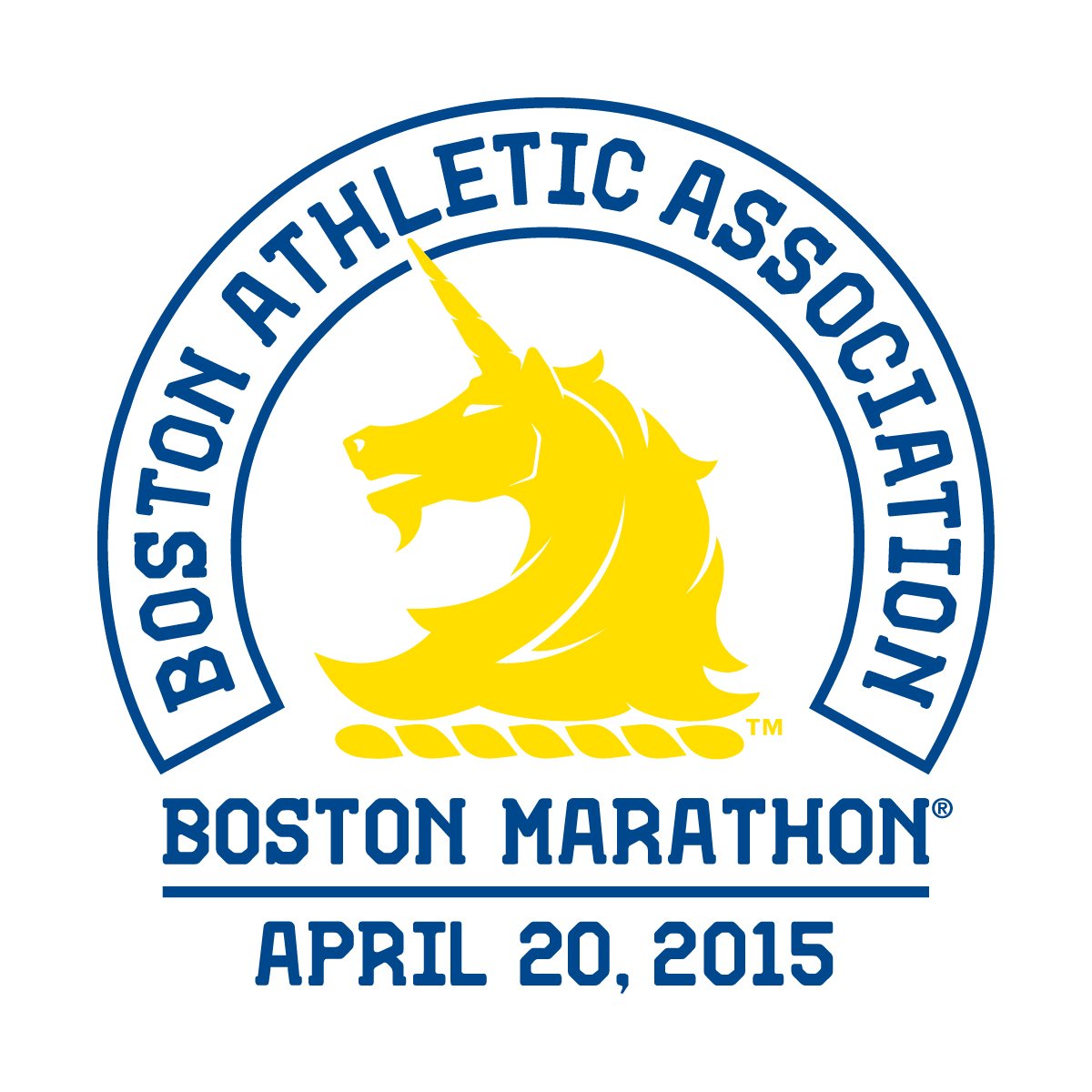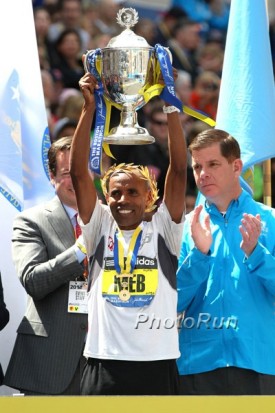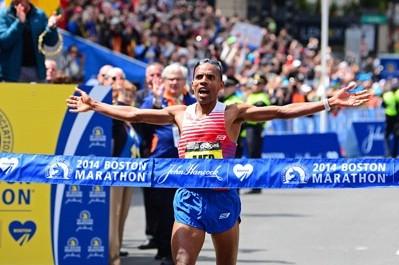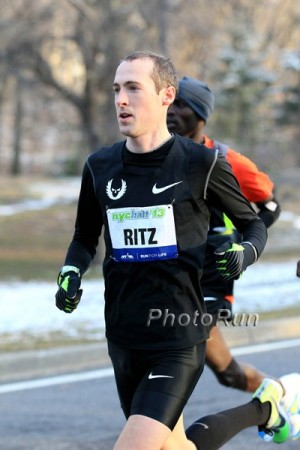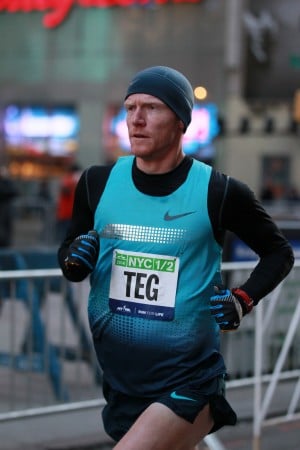2015 Boston Marathon American Men’s Preview: Can Meb Keflezighi Shock The World Again?
By LetsRun.com
April 15, 2015
After appetizers last weekend in cities such as Paris, Rotterdam, Vienna and Milan, it’s time for the main course of the spring marathon season. Next week begins in Hopkinton with the 119th running of the Boston Marathon and finishes at Buckingham Palace with the 35th Virgin Money London Marathon. Both races should be fantastic.
Yesterday, we previewed the international men’s field. Now it’s time to take a look at the Americans who will be toeing the line in Hopkinton on Monday. They include Olympians Dathan Ritzenhein and Matt Tegenkamp and the top three Americans from last year’s race — Jeffrey Eggleston, Nick Arciniaga and, of course, defending champ Meb Keflezighi. The main details for Boston are listed below, followed by a comprehensive breakdown of the domestic men’s field.
What: 119th Boston Marathon
When: Monday, April 20, 2015. Elite women start at 9:32 a.m. ET; elite men start at 10:00 a.m. ET.
Where: Hopkinton to Boston, Massachusetts
How to watch: Live on Universal Sports Network or UniversalSports.com starting at 8:30 a.m ET. Those who don’t subscribe to Universal Sports can also watch live online at watchlive.baa.org. In Boston, WBZ4 will provide local coverage. Universal Sports will also have an hour-long preview show on Sunday at 4 p.m. ET.
Prize money (amount is the same for men’s and women’s races)
1st: $150,000 6th: $12,000 11th: $2,600
2nd: $75,000 7th: $9,000 12th: $2,100
3rd: $40,000 8th: $7,400 13th: $1,800
4th: $25,000 9th: $5,700 14th: $1,700
5th: $15,000 10th: $4,200 15th: $1,500
Abbott World Marathon Majors
Boston is one of six Abbott World Marathon Majors events (Tokyo, Boston, London, Berlin, Chicago, New York). AWMM changed its scoring system earlier this year (previously, champions were crowned over a two-year cycle; now the cycle is one year plus one race). Currently we are in AWMM Series IX, with the standings as follows after one race (Tokyo):
1. Endeshaw Negesse, 25 points
2. Stephen Kiprotich, 16 points
3. Dickson Chumba, 9 points
4. Shumi Dechasa, 4 points
5. Peter Some, 1 point
At the end of the series (which concludes at the 2016 Tokyo Marathon), the athlete with the most points wins the $500,000 grand prize. Scoring is 25 points for a win, 16 for 2nd, 9 for 3rd, 4 for 4th and 1 for 5th.
Ten Months Out
Boston is hugely important on its own, but one of the reasons why the major domestic marathons (Boston, Chicago and New York) are so popular is that each is also a step along the journey to the Olympic Games. We’ve written that one of the reasons why track isn’t popular is that the regular season is largely irrelevant; all that matters is how athletes perform at NCAAs (college) or the Olympics/Worlds (pros). While that is true to a degree in the marathon world (you won’t make Team USA for the Olympics without finishing in the top three at the Trials), the nature of the marathon means that top pros can generally run two, at most three, marathons per year. And that makes those marathons extremely important. Majors like Boston aren’t just the culminations of months-long buildups; they’re chapters in the story of a four-year Olympic cycle.
So as we approach Boston — for some Americans, the final marathon before February’s Olympic Trials — there are no shortage of storylines. The biggest one is obvious: for the first time since 1984, an American enters Boston as the defending champion. But there are also the returns of multi-time Olympians Dathan Ritzenhein and Matt Tegenkamp, neither of whom has raced a marathon since Chicago in October 2013. Finally, Nick Arciniaga, Jeffrey Eggleston and Fernando Cabada will each be looking to continue a progression that they hope culminates with a spot on the wide-open 2016 Olympic team. If you’re not excited about this race, you’ve come to the wrong site.
Can an American Make It Two In a Row? The Odds Are Stacked Against It
Last year, we unscientifically determined that the chances of an American man winning Boston fell somewhere between 1 in 27 and 1 in 19,813. Obviously, the second number is way too low (something we acknowledged at the time) but the 1 in 27 figure was perhaps a little generous. An American did indeed win Boston last year, but that was the only time in the past 31 editions of the race that it had happened, and if anything the African dominatino is much greater now than say 20 years ago. Meb’s PR was 2:09:08 prior to the race (his winning time of 2:08:37 bettered that by 31 seconds). Nobody had won Boston with a PR that slow since Kenya’s Timothy Cherigat in 2004 (who entered with a 2:09:34 PR). Meb’s victory certainly defied the odds.
In many ways, Meb’s win last year is similar to the U.S. men’s silver-medal performance at World XC in 2013. Both came after decades of foreign — particularly Kenyan — dominance (the U.S.’s silver was its first since 1984) and both were totally unexpected. Both races also required a specific set of conditions for the Americans to prevail. The cold, muddy conditions of the World XC course in Poland played into the hands of American runners Ben True and Chris Derrick while hurting the Kenyans. In Boston last year, the field chose not to go with Meb when he and Josphat Boit took off after eight miles (in part because Americans like Ryan Hall elected not to push the pace in the main pack), giving Meb a lead of 1:21 at 30k which would prove to be insurmountable.
The reason why those races were so special — and why they will be remembered many years from now — were because they were so rare. If an American won Boston every year, Meb’s win last year would have been just another American victory, as opposed to one of the most emotional moments in the race’s history. But simple math tells us that when the five fastest men in this year’s field have all run under 2:05 and the next five men have run under 2:07, it’s unlikely to expect a victory when the fastest time by an entered American is Ritz’s 2:07:47.
In fact, it’s probably even less likely an American wins Boston in 2015 than it was in 2014. The first reason is simple: the best American, Meb Keflezighi, is another year older (he’s 39 and turns 40 on May 5). After a certain point, runners get slower, not faster as they age.
Another reason is that Ryan Hall isn’t running. That might sound silly given his DNF at the LA Marathon last month, but when we analyzed the Americans’ chances at Boston last year, he was only two years removed from his last good marathon (and he didn’t run any marathons at all in 2013). In his prime, Hall was capable of summoning a performance that would put him in the hunt for the win at a major. Based on what we knew at the time, there was a (small) chance that 2014 Ryan Hall would be able to win Boston. A year later, that chance is at zero because Hall isn’t running. In his place are Americans Dathan Ritzenhein and Matt Tegenkamp and while there’s a non-zero chance that Ritz wins Boston (we’re putting Teg’s chances at zero), it’s definitely smaller than Hall’s chances a year ago considering that Ritz, like Hall last year, hasn’t raced a marathon for two years and he’s nowhere near as good a marathoner as Hall was in his prime.
The final thing working against Americans is what we’ll call the “Emma Coburn factor.” Coburn, like Meb last year, caught everyone by surprise at the Shanghai Diamond League meet as she gapped the field on the first lap and built an insurmountable lead before the field realized she wasn’t going to die. Coburn won the race in dominant fashion by almost six seconds, and it would prove to be the only DL victory of Coburn’s 2014 season. Coburn didn’t lose her next five DL races because she got slower — in fact, she gained fitness over the summer, running the fastest time ever by an American in Glasgow on July 12. She lost because, after Shanghai, her competition knew that she was a threat to win and that if she pushed the pace early (which she often did on the DL circuit), they had to go with her or risk losing the race.
So how does this apply to Boston? It’s simple. If Meb takes off again after eight miles — or really, at any point in the race — the rest of the field is going to go with him. There is zero chance the field won’t take him seriously and spot him 1:21. As good as Meb was in 2014, if the field had gone with him when he made his break, we think runner-up Wilson Chebet would be the defending champ. If Meb is to repeat as champion, he’s going to have to do it by breaking everyone else (or going out conservatively and reeling in the fading leaders). That basically kills his chances for victory in our mind.
At age 34, Meb on a perfect day was able to beat everyone heads up in New York in 2009. Just two weeks shy of his 40th birthday, we don’t think he’s capable of that anymore. He needs some help — and last year he was spotted 1:21 at 30k.
If Meb is going to upset the form charts at 39 and win another major, he needs an unusual scenario to play out in the race. With last year’s unusual scenario presumably off the table, that’s one fewer way for Meb to win the race. Still, it’s not impossible. A fall or two could take out a favorite as could illness/food poisoning. Remove a couple of the sub-2:05 guys from contention and you never know what might happen.
And with that, let’s take a look at the male American elites one by one, starting with Meb.
Full U.S. men’s elite field
| Name | PB | Nation | Comment |
| Dathan Ritzenhein | 2:07:47 (Chicago, 2012) | USA | 3x Olympian is healthy + ready for 1st marathon since ’13 Chicago (5th, 2:09:45) |
| Meb Keflezighi | 2:08:37 (Boston, 2014) | USA | Defending champ was 4th at NYC in Nov.; 62:17 for 8th at NYC Half on Mar. 15 |
| Jeffrey Eggleston | 2:10:52 (Gold Coast, 2014) | USA | 2nd-fastest American of ’14 was 8th last year, then PR’d to finish 2nd at Gold Coast in July |
| Nicholas Arciniaga | 2:11:30 (Houston, 2011) | USA | 2nd American last year (7th, 2:11:47); 10th at NYC in Nov. (2:15:39) |
| Fernando Cabada | 2:11:36 (Berlin, 2014) | USA | 16th in ’13; coming off pb in Berlin last fall |
| Matt Tegenkamp | 2:12:28 (Chicago, 2013) | USA | 2x Olympian on the track tackles career marathon #2 |
Meb Keflezighi — 39 years old, 2:08:37 pb (2014 Boston), 61:00 half
Last two marathons: 4th, 2014 New York (2:13:18); 1st, 2014 Boston (2:08:37)
Tuneup races: 62:18 for 4th at U.S. Half Marathon Champs on 1/18; 62:17 for 8th at NYC Half on 3/15
Fitness-wise, Meb is likely relatively close to where he was at this point last year. He ran the same two races during his buildup, so it makes sense to compare the results:
| U.S. Half Champs (Houston) | NYC Half | |
| 2014 | 61:23, 1st | 62:53, 10th |
| 2015 | 62:18, 4th | 62:17, 8th |
So he ran better in Houston last year but better in New York (which is closer to Boston) this year. Last year, Meb said that he felt he was actually in better shape in New York than he was in Houston (but that his performance was worse because he was in a heavy block of training). We don’t know if Meb’s New York performance this year came in a similarly heavy training block (we’ll ask him in Boston later this week), but it certainly looks like he’s in better shape than he was in Houston as he ran a better time on a slower course.
At this point, we know what to expect from Keflezighi. He’s a smart racer who excels at getting the most out of his body on race day. On paper, he’s not one of the five best guys in this field, but he has a good shot at finishing in the top five on Monday because he’s unlikely to make any tactical mistakes or push in the wrong places. In addition to his two major titles, Meb has eight other times finished top-5 at a major/Olympics.
One last thing. Meb is playing with house money. He has nothing left to accomplish in the sport, and that means that he doesn’t carry the same pressure or expectations to the start line as some of his competitors.
We covered earlier why a repeat victory is unlikely. There are 12 guys in the field with faster PBs than Meb and while we don’t think Meb will wind up 13th, the odds of all 12 failing to run to their potential and Meb running a great race aren’t great. However, with a win in Boston last year and a fourth in New York in November (along with his past accomplishments), Meb — at age 39 — is still the top American right now until proven otherwise.
Dathan Ritzenhein — 32 years old, 2:07:47 pb (2012 Chicago), 60:00 half
Last two marathons: 5th, 2013 Chicago (2:09:45); 9th, 2012 Chicago (2:07:47)
Tuneup races: 3rd at USA XC on February 7; 63:17 win at Gasparilla Half on February 22; 62:07 for 6th at NYC Half on March 15
If it seems like it’s been a long time since Ritzenhein has run a marathon, that’s because it has been. It has been 18 months since Ritz ran 2:09:45 for 5th place in Chicago in 2013. In the wake of that race, he developed a sports hernia injury that caused him to pull out of Boston last year; he later suffered an ankle injury and ultimately would race just once in all of 2014. Injuries have always been a problem for Ritz — he had to drop out of the Olympic 10,000 in 2004 due to a stress fracture and complications from foot surgery knocked him out for all of 2011, among other bumps and bruises. But he’s shown that, when healthy, he’s a force to be reckoned with at every distance from 5,000 to the marathon, and all indications in 2015 are that Ritz is healthy once again.
He started the year by running a pair of cross country races in Europe in January, winning the 10K Campaccio XC race in Italy on January 6 and placing third at the Great Edinburgh XCountry four days later. Those races served as a major milestone in Ritzenhein’s comeback — evidence that he was once again ready to mix it up with top international competition (he ran just 49:11 for 10 miles in his previous race, in August 2014). His subsequent performances — third at USA XC, a 63:17 victory at the Gasparilla Half Marathon and a 62:07 clocking at the NYC Half last month — showed that he is in good shape.
Right now, it seems likely that Ritz isn’t the same runner that he was in 2012 (when he ran 2:07) or 2013 (when he finished 5th at Chicago). It takes time to regain fitness, and he’s not all the way back. But he remains one of the most talented American runners, particulary American-born in history.
Ultimately, the goal for Ritz is to make it to the Olympic Trials in one piece and punch his ticket to Rio. But if he’s healthy — and he is right now — he should be capable of a good performance in Boston. His ceiling is probably 3rd or 4th overall, and it’s certainly possible that he beats Meb and finishes as the top American. Remember: his PR is 50 seconds faster than Meb’s and 3:05 better than the next American, Jeffrey Eggleston.
Matt Tegenkamp — 33 years old, 2:12:28 pb (2013 Chicago), 62:04 half
Last marathon: 10th, 2013 Chicago (2:12:28)
Tuneup races: 7:55.10 for 5th in 3k at Washington Invitational on Jan. 31; 13:41.90 for 7th in 5k at Millrose Games on Feb. 14
Tegenkamp is a lot like Ritz – a huge sub-13:00 talent who has been largely quiet since running his last (and so far, only) marathon in Chicago in 2013 because of injury. A hip problem prevented him from running a fall marathon last year and he initially didn’t have plans for a spring marathon before announcing he would run Boston on March 10. However, his training was going well enough for him and coach Jerry Schumacher to add Boston to the schedule (he said he was going to do a marathon block of training this spring whether he raced a marathon or not), which is a good sign — they wouldn’t rush into it if they didn’t feel he was ready to run well.
10 months out from the Olympic Trials, if you were to break down the U.S. Olympic hopefuls, at the moment, they’d probably look something like this:
Tier 1
Meb Keflezighi
Tier 2
Dathan Ritzenhein (if healthy)
Tier 3
Almost everybody else (Only sub-2:14 guys should be dreaming of Rio)
Tier 4
Everyone else including you and your mom
Wildcard
Ryan Hall
Tegenkamp is in that large third group, though you can break it down into subsections. He’s not like Ryan Hall or Abdi Abdirahman — proven marathoners that haven’t run a good one for a while. And he’s not like Arciniaga, Eggleston, Ryan Vail or Jared Ward — guys who have achieved success in the marathon but have yet to hit the level required of making an Olympic team. His best comparison is Bobby Curtis — a guy who had success on the track but has yet to ‘nail the marathon’ (though Tegenkamp was much better on the track than Curtis).
And there is some doubt as to if he’ll ever ‘nail the marathon.’ Remember, this is a guy who in his prime said he didn’t do the 10k. He’s over 6′ tall which is very tall for the marathon as we pointed out two years ago: MB: Fastest Marathoners over six feet tall (1.83m or taller).
So what does that say about his chances on Monday? It means we need more information. Tegenkamp has achieved some great things on the track — two Olympic teams, a 12:58 5k pb, 4th at Worlds in 2007 — but everyone adapts to the marathon differently. The raw materials are there for Teg to become a successful marathoner, and his debut was certainly adequate (2:12). But he’s raced sparingly since then and his only tuneup on the roads was cut short. From Runner’s World:
“At the NYC Half on March 15, Tegenkamp’s calf got tighter and tighter with every step in the last three miles, and he jogged in. But before that, he says, ‘the message from that race is that I can run 10 miles with Meb and Dathan, who’ll be in Boston.'”
If his body cooperates, Tegenkamp has the talent to compete with the top Americans in Boston.
Nick Arciniaga — 31 years old, 2:11:30 pb (2011 Houston), 63:22 half
Last two marathons: 10th, 2014 New York (2:15:39); 9th, 2014 Grandma’s (2:14:31)
Tuneup races: 1:34:14 for 5th at Ohme-Hochi 30K (2:12:32 pace) in Japan on Feb. 15; 44:58 win at Mountain to Fountain 15K in Phoenix on March 8
Jeffrey Eggleston — 30 years old, 2:10:52 pb (2014 Gold Coast), 62:41 half
Last two marathons: DNF, 2014 Fukuoka; 2nd, 2014 Gold Coast (2:10:52).
Tuneup races: 62:41 for 7th at US Half on Jan 18th; 66:42 (9th) at the San Blas Half Marathon in Puerto Rico on Feb. 8; 64:03 for 17th at NYC Half on March 16th.
The second and third Americans from Boston last year (Arciniaga was seventh overall in 2:11:47; Eggleston finished one place and 10 seconds behind him), both these guys are coming off strong years in which they strung together multiple good marathons. Arciniaga notched two top-10 finishes in majors (he was also 10th in NYC), while Eggleston finished as the fastest non-Meb American on the year thanks to his 2:10:52 pb at Gold Coast (Australia) in July. Both have been making steady progress toward a spot on the 2016 Olympic team, but neither has registered a performance that would separate them from the likes of Ryan Vail or Jared Ward.
It’s not for lack of trying, however. Both runners are known to aim high, but have yet to experience a race where everything comes together.
“Arciniaga ran 2:11:30 for second place in Houston back in 2011, and he’s been near that mark several times, including last year’s 2:11:47 for seventh in Boston,” writes Runner’s World‘s Peter Gambaccini. “‘Each time, I’ve been at 20 miles at 2:09 pace,’ [Arciniaga] told Runner’s World. ‘One of these times I’ll get that last 10K. It’s that enduring faith that I have in me that keeps me motivated.’”
Likewise, Eggleston was ran aggressively in search of a big pb in Fukuoka last December, going out in 63:38 for the half before falling off and ultimately registering a DNF (read our post-race chat with him here). He and Arciniaga know that to be competitive internationally — and to make the U.S. Olympic team — they need to reach a new level in their racing.
Who has the better shot to do that on Monday? It’s hard to say. Outside of marathons, Arciniaga’s racing schedule is eclectic (he won the inaugural Star Wars Half Marathon in January in 68:13), which makes it difficult to tell exactly what kind of shape he’s in. Eggleston looked to be in great shape in January, setting a HM pb of 62:41 in Houston, but since then he’s only run 66:42 (9th) at the San Blas Half Marathon in Puerto Rico on Feb. 8 and 64:03 (17th) at the NYC Half on March 15.
Repeating their performances from a year ago would be an impressive achievement, but with the Olympic Trials just 10 months away, these two runners in need of a breakthrough might regard that as slightly disappointing.
Fernando Cabada — 32 years old, 2:11:36 pb (2014 Berlin), 62:00 half
Last two marathons: 11th, 2014 Berlin (2:11:36); 16th, 2013 Boston (2:18:23)
Tuneup races: 63:23 for 14th at NYC Half on March 15; 66:26 win at San Francisco Rock ‘n’ Roll Half on March 29; 28:32.68 for 5th at Stanford Invite 10k on April 3
Cabada, who has yet to register a top-10 in a major, isn’t quite as accomplished as the other Americans in this field, but he’s trending in the right direction after running a 17-second pb in Berlin last fall. A top-10 finish on Monday would be a good result for him.
Want to learn more about Cabada’s Boston preparations? Check out his video series here.
Vote in the polls below and then discuss the American runner’s chances in our world famous fan forum: American men at 2015 Boston – Can Meb (or anyone else like Ritz, Teg, Eggleston, Arciniaga) shock the world again?
| [gravityform action=”polls” id=”129″ mode=”poll” cookie=”1 month” show_results_link=”false” display_results=”true” percentages=”true” counts=”false” ajax=”true”] | [gravityform action=”polls” id=”130″ mode=”poll” cookie=”1 month” show_results_link=”false” display_results=”true” percentages=”true” counts=”false” ajax=”true”] |
